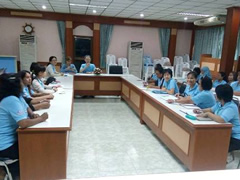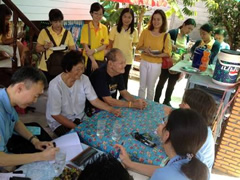Project News
2016-10-17
Hearing Meetings at the Project Sites
LTOP held hearing meetings to collect opinions on current project situations from staff at all project sites. The staff who stated their opinions included local government officers, care managers and care workers. We also asked some frail elderly who have received services from LTOP and their family members impressions on the project. These opinions will be reflected to the project activities and the policy recommendation for long term care in process.
Local government officers were asked about the roles of local government for long term care and impact of LTOP. Its roles on the elderly care were mainly coordination between medical/health service and social welfare service. In addition, human resource development for long term care in community like volunteers, house renovation and supports for the poor were also roles of a local government. As for impact of LTOP, services for the elderly became more systematic enhancing cooperation between medical sector and social welfare sector. On the other hand, there was an opinion that services for social welfare aspect were not enough for the elderly.
Care managers were asked about how to find a new case, feeling of work load, and necessary background of care manager. New cases were reported both from family members of the elderly and health volunteers in community and from hospitals when the elderly discharged. After reported, a care manager examined physical abilities and family environments of a new case, then discussed among staff if the case included and how they supported the case.
Feelings of work load differ among care managers. Care managers have usual duty such as nurse or local government officer. Some did not feel burden working with good balance with usual duty, others feel burden due to difficulty in taking balance between care management and usual duty. Many care managers had an opinion that burden of paper works was as heavy as Japanese care managers feel.
Currently, care managers are co-medical staff like nurses and physical therapists, and local government officers. Asking who should act as a care manager in the future, most of the answers were medical staff because care manager's main duties include cooperation with a hospital staff. On the other hand, others answered that medical background was not always necessary and anybody can be a care manager with efforts.
Care workers were asked about contents of their work and an allowance. They visited the elderly home and checked their blood pressure, instructed exercises, had chats and so on. Care workers sometimes helped house works such as preparing meal and cleaning house. Frequency of visiting was different among sites, some once a week, others once every two weeks. Allowances for care workers were also different among sites. Some sites paid, others did not pay. However, care workers at every site expressed opinion that they needed compensation for gasoline expense because many of care workers visited by motor cycle.
From the elderly and their families, there were opinions that home visit services improved their conditions physically and mentally. There were also some requests including supports for consumables such as diaper and increase of home visit services or day care services. Some families also asked for economical support because of poverty.
Through these site hearings, LTOP team understood deeply activities and situations at the sites. These voices will be utilized to improve the project activities and to submit the better policy recommendation for long term care in the future.
 Hearing from care workers
Hearing from care workers
 Home visiting
Home visiting
- About JICA
- News & Features
- Countries & Regions
- Our Work
- Thematic Issues
- Types of Assistance
- Partnerships with Other Development Partners
- Climate Change / Environmental and Social Considerations
- Evaluations
- Compliance and Anti-corruption
- Science and Technology Cooperation on Global Issues
- Research
- JICA Development Studies Program / JICA Chair
- Support for the Acceptance of Foreign HRs / Multicultural and Inclusive Community
- Publications
- Investor Relations
